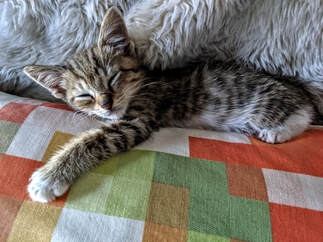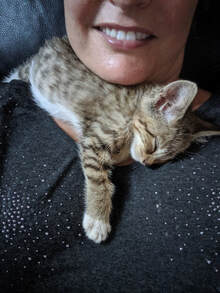How much sleep is considered normal?
If you are a new pet owner, one important piece of advice to go by is that the younger the kitten, the more sleep that is required. A new-born cat will spend up to 90% of their day getting sleep while as it grows older, this duration gradually reduces.
This makes it nearly 22 hours of a new-born’s day. However even at around six months of age, they would still continue getting around 16 to 20 hours of shuteye!
What is the reason behind their prolonged hours of sleep?
While it may seem that your new pet is taking a lot of time off, the truth is far from it. When the kitten is asleep, it’s body is in full work mode. Development of the brain and the central nervous systems are dependent on these frequent periods of sleep.
The time spent napping helps to strengthen the muscles that give this species the athleticism it is known for. Additionally, cat naps help in keeping the immune system efficient and running in top shape. Without it, the feline is likely to grow irritable and stands at higher risk of illness and infection.
This kind of extensive sleep pattern has evolutionary roots. Like its feline ancestors in theAfrican plains, these cats too have some of its genetic traits still intact. They slept for most of the day and hunted for short periods of time to conserve energy.
Your kitten’s sleep patterns are reflective of this. As wild cat cubs, sleeping would keep these defenseless beings quiet and away from any lurking predators.
When is there a problem?
Long hours of sleep should usually not be a cause of concern as a pet owner. However, sometimes this sleep can be indicative of other problems. While we agree it is hard to keep track of just how long your kitten spends sleeping, two things to look out for are as follows:
a) Whether he/she has low energy when they are awake and
b) if the amount of time increases noticeably.
This can be a sign of anemia--a condition when the body is starved on red blood cells and can be very fatal; especially for kittens. If you are worried that your kitten might have it, check if its gums are pale because it paleness is a sign of the illness.
While it is uncommon for kittens to get less hours of sleep, it can still happen. Rare seizures and sleep disorders can prevent them from getting the sleep they need. If there is a noticeable reduction in nap time, it is advisable to visit the veterinarian to get a more detailed diagnosis.
How to improve your kitten’s sleep life?
Adults have the ability to adapt their sleeping patterns according to routine, or at least to a certain degree. Kittens usually will take some time to learn this. If your kitten wakes you up prior to you waking up, which they are most likely to do in the initial few days, it is for either of the three reasons-- to eat, to play or to be adored.
1. Designate a proper sleeping place for it. Whether this is in your bed or in another room with a designated cat bed, a quiet and safe place to rest and call his own will help your kitten sleep at night. Make sure all adults and children are aware to not disturb a sleeping kitten.
2. If dinner is hours before its bedtime, the nightly purrs may be due to hunger. Kittens tend to sleep better with a full belly, so make sure you schedule dinner right before your bedtime and leave a small amount of cat food accessible for the night.
3. Incorporate more play and enrichment throughout the daylight hours. As long as your kitten is 7 to 8 weeks old and up, take advantage of his waking hours to expend his energy.
4. Unless you suspect your kitten is waking you due to illness of injury, don’t get out of bed and tend to him. Kittens learn what works, If you end up tending to them, there is a high chance that it might become a habit as they learn what works to get your attention.
5. Give it time. Kittens wake more at night than adult cats tend to do. Though it can be an exhausting time for their sleep-deprived owners, kittenhood passes quickly and will give you abetter night’s sleep!
Conclusion
Kittens usually sleep for long durations of time and is not a sign of concern. If however, there are noticeable changes in their sleep pattern, it is advisable to consult a doctor for a closer look.
Guest post by Anoop Nain proud father of four rescued dogs and two Flemish giant rabbits. Besides being a full-time dog father, I am a freelance content writer and an educationist, with more than 6 years experience in the field of content writing. In the span of six years, I wrote for various industries but one project that remains closest to my heart is my stint with People for Animals as their social media page manager. It was while working with them I got an opportunity to educate people on animal rights, pet healthcare, animal welfare and various other issues pertaining to animals. My Blog:- https://www.flemishgiantrabbit.com/



 RSS Feed
RSS Feed

